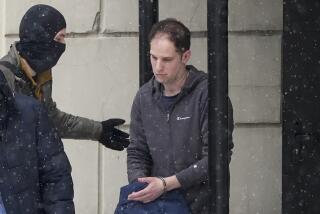Freed Refuseniks Keep Fight Alive for Soviet Jews Left Behind : Vladimir Slepak Laments Trickle of Emigration in Talk at Encino Synagogue
- Share via
Only a grandparent denied the kiss of a grandchild can begin to appreciate the emotion that washed over Vladimir Slepak that day last month when he first saw the children of his two sons at Kennedy International Airport.
The moment was all the more poignant because of the longtime rift between the 60-year-old electronics engineer, who waited for permission to emigrate to Israel longer than any other Soviet Jew, and his late father, a hard-line Bolshevik who once denounced Slepak as an enemy of the people.
“What do you say about our feelings?” asked Slepak, 60, a burly, bearded Jewish activist who spent nearly five years in Siberian exile for unfurling a banner that read, “Let Us Go . . . “
“I think every father and grandfather can understand how, after 10 years and eight years, I met my sons and how I met my grandchildren whom I have never seen.”
First Appearance
Slepak on Monday night made his first North American public appearance since he and his wife, Mariya, 61, left the Soviet Union Oct. 25. At Valley Beth Shalom synagogue in Encino, he spoke of some improvement in the life of Soviet Jews under Mikhail S. Gorbachev, but lamented the trickle of Jewish emigration.
A highlight of Slepak’s speaking tour, sponsored by the United Jewish Appeal, will be an appearance next Sunday in Washington at a rally on behalf of Soviet Jews. President Reagan and Gorbachev are to open talks in the capital the following day.
Slepak, who waited 17 years before the Soviet government allowed him to leave the country, spoke of his break with his own father in an interview before his speech.
“When I told him I wanted to leave the Soviet Union (in 1969), he said that I am a traitor, an enemy of the people, he broke all connections,” Slepak said. Yet, he said, nine years later, when the elder Slepak was informed that his son had been sentenced to five years of internal exile, the 86-year-old Bolshevik suffered a heart attack.
“We got information later, his second wife . . . she told my cousin that . . . this strong Communist, in the last two days of his life, was praying in un-understandable languages,” Slepak said.
“In Hebrew, he was praying,” Slepak’s son, Leonid, interrupted. “And all his life he was an atheist.”
Leonid Slepak, 28, was allowed to leave the Soviet Union in 1979. He interrupted a career with the William Morris Agency in New York to campaign full time for his parents’ exit visa. The couple’s elder son, Alexander, 35, left the country in 1977, traveling first to Israel and then to Philadelphia, where he completed medical school.
More Exit Visas
Under Gorbachev, Vladimir Slepak said, the jailing of those who wish to emigrate has ended, and the number of exit visas has increased to 8,000 a year. But in 1979, he said, more than 50,000 Jews were allowed to leave the Soviet Union.
Gorbachev wants to “raise the effectiveness of the Soviet economy,” Slepak said. “It is his main task now. But he understands, he’s smart enough, (to see that) everything is linked one with another.
“For this he needs credits, new technology . . . from the West. So he must have good face. So to fulfill his reforms in economics, he has to change something in the internal society. . . . But he wants to make it as less as possible.”
Ultimately, Slepak said, he does not believe the Soviet leader will succeed. “If he’ll make the real reforms, he can lose control over the Soviet system. But he doesn’t want that.” It is, Slepak said, a “very dangerous” period.
More to Read
Sign up for Essential California
The most important California stories and recommendations in your inbox every morning.
You may occasionally receive promotional content from the Los Angeles Times.













